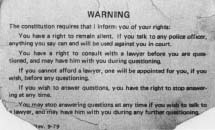Ernesto Miranda Trials: 1963 & 1967
Conviction Overturned
With Miranda's conviction overturned, Arizona glumly faced the prospect of having to free its most celebrated prison inmate. Without the confession, the chances of winning a retrial were negligible. Ironically, it was Miranda himself who brought about his own downfall. Expecting to be released after retrial, he had begun a custody battle with his common-law wife, Twila Hoffman, over their daughter. Hoffman, angry and fearful, approached the authorities and revealed to them the content of a conversation she had had with Miranda after his arrest, in which he had is the rape.
 The Miranda warning ensures that the accused is informed of certain rights after being arrested.
The Miranda warning ensures that the accused is informed of certain rights after being arrested.
This fresh evidence was all Arizona needed.
Miranda's second trial began February 15, 1967. Much of the case was argued in the judge's chambers. At issue: Could a common-law wife testify against her husband? Yes, said County Attorney Robert Corbin. Defense counsel John Flynn, who had pleaded Miranda's case before the Supreme Court, bitterly disagreed. After considerable legal wrangling, Judge Lawrence K. Wren ruled such evidence admissible, and Twila Hoffman was allowed to tell her story to the jury. It proved decisive. Miranda was again found guilty and sentenced to a 20-to-30-year jail term.
On January 31, 1976, four years after being paroled, Ernesto Miranda was stabbed to death in a Phoenix bar fight. The killer fled but his accomplice was caught. Before taking him to police headquarters, the arresting officers read the suspect his rights. In police vernacular, he had been "Mirandized."
The importance of this case cannot be overstated. Denounced by presidents from Richard Nixon to Ronald Reagan, the Miranda decision has withstood all attempts to overturn it. Framed originally to protect the indigent and the ignorant, the practice of "reading the defendant his rights" has become standard operating procedure in every police department in the country. The practice is seen so frequently in television police dramas that today the words of the so-called "Miranda Warning" are as familiar to most Americans as those of the Pledge of Allegiance.
—Colin Evans
Suggestions for Further Reading
Baker, Liva. Miranda: Crime, Law and Politics. New York: Atheneum, 1983.
Graham, Fred P. The Se/f-Inflicted Wound. New York: Macmillan Co., 1970.
Skene, Neil. "The Miranda Ruling." Congressional Quarterly (June 6, 1991): 164.
Tucker, William. "The Long Road Back." National Review (October 18, 1985): 28-35.
Additional topics
Law Library - American Law and Legal InformationNotable Trials and Court Cases - 1963 to 1972Ernesto Miranda Trials: 1963 1967 - Tainted Evidence, Conviction Overturned